Immigration

Church leaders today gathered in Washington, D.C., to announce the launch of the Evangelical Immigration Table – a broad coalition of organizations, churches and pastors from across the political and religious spectrum coming together to advance a cohesive immigration reform message.
The Immigration Table was launched at a press conference, with speakers including Sojourners CEO Jim Wallis, Dr. Richard Land, President of the Ethics and Religious Liberty Commission, Gabriel Salguero, President of the National Association of Latino Evangelicals and Tom Minnery of Focus on the Family, setting out a common set of principles reflecting the common ground that all members of the Table have found on the issue of immigration.
Read on to view photos from the press conference.
Evangelical leaders from across the political and religious spectrum meet today to call for immigration reform based on a set of five principles:
- Respects the God-given dignity of every person
- Protects the unity of the immediate family
- Respects the rule of law
- Guarantees secure national borders
- Ensures fairness to taxpayers
- Establishes a path toward legal status and/or citizenship for those who qualify and who wish to become permanent residents
Watch the live stream from Capitol Hill, beginning at 11:30 EDT HERE:

When I walk into Paola's first-grade classroom, I'm aware of her poverty. Nine out of 10 of the students at our school meet the federal poverty level guidelines. She is one of them.
She lives in a small apartment with her grandma, mom, sister and uncle; they make less than $26,170 a year.
As the Nobel Prize-winning economist Paul Krugman reminds us, she is all too likely to suffer from poor nutrition, inadequate health care, an inferior education and a bad future.
I'm struggling against her life-crushing poverty with all of the compassion, creativity and commitment within me.
Yes, I'm aware of her poverty. Today, however, I don't see it.
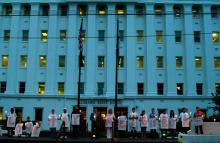
Here we are today, caught in an economic slump, finding ways to once again dehumanize those that we encouraged to come. The very people who have harvested our food, built our homes and served us over the past 30-plus years, we now declare criminals.
In my beloved Alabama, where 3 percent of the population (largely Hispanic) is estimated to be undocumented, our state government has created the harshest and most egregious anti-immigrant laws in the country. Rep. Micky Hammon and Sen. Scott Beason, sponsors and writers of HB56, stated that these laws would create an atmosphere of “self deportation.” I can only wonder how Native Americans might feel about that concept.
HB56 — passed by the legislature and signed into law by Gov. Robert Bentley in June 2011 — has now been replaced by HB658. The stated purpose of the new legislation was to simplify HB56 and make enforcement less complicated. In the process, stricter guidelines and harsher treatment were incorporated while simplification was ignored.
I am compelled to look at this law as a child of God within the Christian faith, accepting that all people in this world are my brothers and sisters, created by the God who breathed life into me and into them, making us one family.
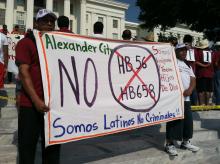
Hundreds of Alabamians gathered at the state Capitol grounds after their legislators passed HB 658, a harsher version of now infamous anti-immigrant HB56.
HB658 calls for the creation of an online public database to expose individuals’ identities. The database would list the names of all undocumented immigrants who have appeared in court. In addition, the law targets innocent children by requiring schools to check the immigration status of students. It is both reckless and morally indefensible.
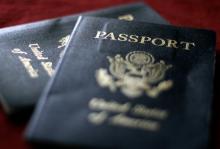
The debate over immigration policy and border security often focuses on the border shared by the United States and Mexico. However, The New York Times recently offered a revealing and troublesome picture of efforts by the U.S. Border Patrol along the dividing line between the US and Canada.
According to the report, the border agents “hover outside the warehouse where Mexican immigrants sell the salal they pick in the temperate rain forest. Sometimes they confront people whose primary offense, many argue, is skin tone.”
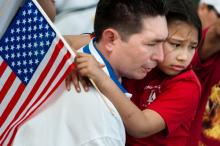
Last week, Alabama Gov. Robert Bentley made a morally indefensible decision. He signed HB 658, which intensifies the climate of fear that already hangs over Alabama like low dark clouds before a hurricane.
Bentley once claimed that HB 658 would simplify HB 56 — the current anti-immigrant legislation that catapulted Alabama to the national stage. If this is simplification, then I’d like to see Bentley’s version of messed up. HB 658’s additional punitive measures now have created a more problematic situation that exacerbates the current oppression of some of the most vulnerable souls in Alabama.
The new law is reckless. HB 658 calls for the creation of an online public database to expose the names of all undocumented immigrants who have appeared in court. In addition, the law targets innocent children by requiring schools to check the immigration status of students.
As reported by Salon:
Rep. Steve King, R-Iowa, compared immigrants to dogs at a town hall meeting yesterday, telling constituents that the U.S. should pick only the best immigrants the way one chooses the “pick of the litter.”
Read the full report of the incident here

In an uncharacteristic move, televangelist and bestselling author Joel Osteen, senior pastor of Lakewood Church in Houston, Texas, stepped into the political arena briefly to talk about Alabama's House Bill 56, the strictest anti-illegal immigration legislation in the nation.
Osteen, who unlike many of his television compatriots, normally eschews entering into the political fray, was in Alabama last week for an event and during an interview with a local television station, a reporter asked him about having to choose between faith and breaking civil laws, in the context of HB56, which would make it illegal for undocumental immigrants to receive any public benefits at the state or local level, attend publicly-owned colleges or universities, transport, harbor, employ or rent property to undocumented immigrants in Alabama.

They call it the field de calzon — the "field of panties" —because so many rapes happen there.
On Wednesday, the organization Human Rights Watch released the report Cultivating Fear: The Vulnerability of Immigrant Farmworkers in the US to Sexual Violence and Sexual Harassment. It’s filled with tales that would make Jeremiah, or Amos, or Micah weep: stories of some of the most marginalized, exploited, and impoverished people in the country.
HRW talked to 160 farmworkers, growers, law enforcement officials, attorneys and other experts in agricultural workplace issues in 8 different states, finding that most women working in agriculture have been — or know someone who has been — victimized sexually at work; confirming the findings of a 2010 survey of California Central Valley workers in which 80 percent reported having experienced sexual harassment or abuse on the job.
It’s common enough that some women farm workers see it as “an unavoidable condition of agricultural work.”

The House of Representatives passed on Wednesday a version of the Violence Against Women Act that would limit protections to immigrant, LGBT and American Indian abuse  victims. House Republicans argue that Democrats are politicizing a non-issue, but stating fact is not partisan politics.
victims. House Republicans argue that Democrats are politicizing a non-issue, but stating fact is not partisan politics.
The new version of the bill not only deletes new protections that received bipartisan support in the Senate, but also eliminates ones that existed in previous versions of the Act. For instance, the new version could make it more difficult for immigrants married to abusive U.S. citizens come forward for fear of losing their residency.
For CNN, Leith Anderson and Lynne Hybels on the new version of the Violence Against Women Act being debated by Congress:
This week the House of Representatives is considering a proposal to reauthorize the Violence Against Women Act, first enacted in 1994, but in a new version that would significantly undermine the same U visa program that provided Nicole with safety and permanency in the United States. The U.S. government estimates that as many as 17,500 foreign-born victims are illegally trafficked in from abroad each year, and academic estimates suggest that at least 100,000 victims of human trafficking live in the United States today. By force, fraud or coercion, traffickers keep victims enslaved in prostitution or forced labor.
Read their full article here
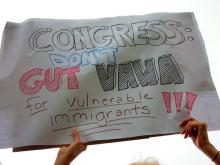
Some victims, it seems, are more worthy than other victims. This is the clear message sent by a deeply flawed version of the Violence Against Women Act that is headed for a vote in the U.S. House of Representatives.
But our faith dictates that such a dichotomy—worthy and unworthy—cannot be allowed.
 VAWA, as the act has been known since it was first passed in 1994, represents years of progress and bipartisan commitment on the part of Congress to protect victims of violence. But the version up for reauthorization in the House of Representatives, H.R. 4970, would roll back VAWA’s existing protections for battered immigrants leaving them more vulnerable —and in some cases, endangering their lives.
VAWA, as the act has been known since it was first passed in 1994, represents years of progress and bipartisan commitment on the part of Congress to protect victims of violence. But the version up for reauthorization in the House of Representatives, H.R. 4970, would roll back VAWA’s existing protections for battered immigrants leaving them more vulnerable —and in some cases, endangering their lives.
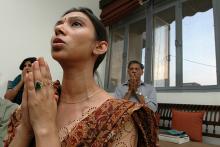
LOS ANGELES -- Even though she met her husband through an arranged marriage, Pooja Sindhwani considers herself a modern woman. She worked in interior design in her native India for four years, and she and her husband spent a year getting to know each other before their wedding. When she followed her husband to Houston, she wasn't worried about adjusting to life in the United States.
"You feel you're going to a country that offers opportunities," Sindhwani said, "you expect that things will work out."
Except when they don't.
Unable to land a job in Houston, Sindhwani slipped into depression. Like thousands of Indian women, she was issued an H-4 "dependent spouse" visa that did not allow her to work.
Sindhwani's husband was a highly skilled foreign worker, sponsored by a U.S. company on an H-1B visa. The Indian women who marry highly skilled workers also tend to be well-educated professionals. Many think it will be easy to transfer from a dependent spouse visa to a work visa.
The constant rejections from companies that couldn't sponsor her work visa took a toll on Sindhwani.
-copy_0.jpg)
Our friends at the National Immigration Forum started a new campaign today to advocate for Citizenship and Integration grant funding. Last year, Congress cut all funding forthese important programs that help welcome new Americans to our country. The Department of Homeland Security budget does not reflect the biblical commandment to welcome the stranger. We must once again remind congress, budgets are moral documents.
Check out their website to learn more.
Civil disobedience hits the Alabama State Legislature today in opposition of the HB56 legislation on immigration. See the livestream for the latest updates:

Many people in our country say that their Christian faith is a significant force in their lives. I am one of those people. As I listen to my sisters and brothers in the church discuss immigration legislation, I wonder why our faith hasn’t lead us into a way of life that defuses this contentious debate.
If, as Christians claims, the story of the Bible is important to us, then we shouldn’t be so worried about foreigners; we shouldn’t be so afraid of immigrants.

I participated the Jericho March for people of faith, organized by the New Sanctuary Movement of New York. We walked the half mile loop around the Supreme Court in silence, praying for a society that builds up justice and dignity. The tough part about this morning was dealing with “the others.”
The future of Arizona’s immigration law, and by extension the laws in a number of other states modeled on it, was argued before the Supreme Court this morning. While it’s always dangerous to read too much into the questioning during the oral argument, early news reports indicate that the justices were sympathetic to the provision allowing police officers to check the immigration status of people who are arrested or otherwise detained.
According to the Associated Press:
"Liberal and conservative justices reacted skeptically to the Obama administration's argument that the state exceeded its authority when it made the records check, and another provision allowing suspected illegal immigrants to be arrested without a warrant, part of the Arizona law aimed at driving illegal immigrants elsewhere."
The Court’s decision is expected in June, and could become an important issue in the presidential election campaign.
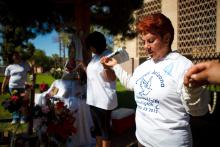
Today, the Supreme Court is hearing a case about the constitutionality of Arizona’s anti-immigrant legislation, SB 1070. It will be months before the case is decided but a broad spectrum of the Christian community already has their minds made up.
This legislation is not just ethically bankrupt but undermines basic Christian values and American ideals. The court will decide whether it is legal, but it is already clear it isn’t moral.
We are both evangelical Christians. One of us is white and one of us Hispanic. It is our common faith commitment, not the color of our skin, that unite us on the need for comprehensive immigration reform and in opposition to patchwork punitive legislation like we have seen in states like Arizona and Alabama.